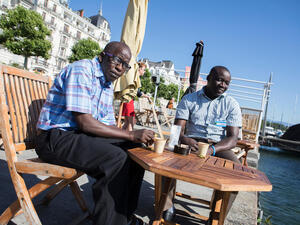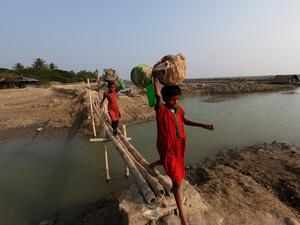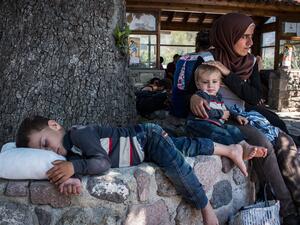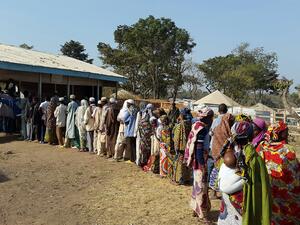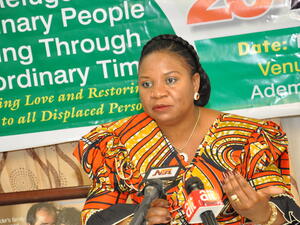Q&A: Egyptian actor looks back on work as Goodwill Ambassador
Q&A: Egyptian actor looks back on work as Goodwill Ambassador

Adel Imam, UNHCR Goodwill Ambassador, talks with Iraqi refugees at Douma registration centre on his two day visit to Damascus, Syria.
GENEVA, December 5 (UNHCR) - Egyptian actor Adel Imam is a huge star of screen and stage in the Arab world who brings comedy as well as gravitas to his performances. Many of his films and plays address important social issues. Since 2000, he has also been spreading awareness as a UNHCR Goodwill Ambassador about the plight of millions of uprooted people, especially those in the Middle East. During his travels, Imam often visits UNHCR staff and field operations. He was recently in Geneva to attend a Cinema Verité gala dinner. The 68-year-old thespian took time to talk to UNHCR Web Editor Leo Dobbs about his work. Excerpts from the interview:
How did you become involved with UNHCR and refugee issues?
I was approached. But many years ago I had seen a photograph of the actress Audrey Hepburn, who was also involved with the United Nations, helping children in Africa and elsewhere. That image stayed in my mind for a long time. I would think about it on-and-off and think about how I could make a similar kind of contribution. Then UNHCR approached me, seeing a chance to reach out to millions of people across the Arab world because of my popularity and influence in the region. I thought this would be a wonderful opening and a good opportunity to reach out and make a positive contribution to humanity and to help people who were desperate and in need.
In many of my films, I fight against discrimination and raise awareness about poverty and social problems - issues that need to be addressed, but which are often not discussed easily. That was the way that I got involved. Since then, I've travelled to many places and seen ... the desperation that refugees live in. I'm very proud that I've managed to help solve some problems in certain areas and I hope I can continue doing this.
Give us an example or two
I was able to help [in 2000] in Yemen, where the refugees are confined to camps and settlements unlike in some other countries, like Egypt, where they are free to move around. When I visited the [Kharaz] camp, I saw that the refugees were limited in their movement. So when I met President Ali Abdullah Saleh, I managed to get his approval for the creation of a road from the [Kharaz] camp to the capital. That facilitated the movement of the refugees.
Another example where I was able to help was during my last visit to Syria, which was organized by UNHCR. I was there [in September 2007] to get a first-hand look at the situation of Iraqi refugees, who had been received very generously and with open arms by the Syrians. But some sensitivities were beginning to emerge because of the difficult economic situation that was beginning to affect the world, especially the [Middle East] region. In Syria, the government subsidizes food and fuel costs for its citizens - so some tensions began to arise between the Iraqis and the Syrians. And there were also cases of domestic violence.
In my discussions with the authorities, they said they were doing everything possible to try and improve conditions, especially for Iraqi children.... My intervention was related to some Iraqi children who were stuck at the border.... They were having trouble surviving because of a lack of food and water, but I facilitated [their getting entry visas] and these children are now much better.
You mentioned Yemen. What are your thoughts about the flow of people making dangerous sea crossings from the Horn of Africa to Yemen?
It's a very tragic situation, even though this route has existed for a long time. From the Horn of Africa to Yemen and onwards, a lot of migrants and refugees have tried to reach Turkey and Europe. It's very tragic the way people are thrown into the water and never reach the shore they are trying to escape to. Many people, the elderly and women and children, drown.
Do you have any outstanding memories as a Goodwill Ambassador?
The thing that had the biggest affect on me occurred in Cairo, when more than 18 Sudanese refugees who had been taking part in a sit-in protest [against certain policies] lost their lives [when police raided their protest camp on December 30, 2005]. I was very much involved in negotiations with the refugee leaders prior to that event. I would spend 10 or 11 hours a day in discussions with them. I even started smoking again because of all the stress and anxiety.
They had some requests that were very difficult to meet.... I was trying to find middle ground between the refugees, the UNHCR office in Cairo and the Egyptian authorities. In the end when the events turned to tragedy, I felt in a very awkward situation. I was very sad to see the final result.
A lot of your films are comedies and you have been called the Charlie Chaplin of the Arab world. Can one use comedy to raise awareness?
Chaplin is the father of all comedians. He is the boss.... Yes, of course [you can use comedy to raise awareness]. In my next film, I will touch briefly on poverty and desperation in Africa and the needs that people have there. It will be partly comic, but I will use it to raise awareness about issues that are important. I know that [UNHCR Goodwill Ambassador] Angelina Jolie made a movie about similar issues.
When you meet refugees or displaced people, can you help them with your humour. Do you try to make them laugh?
They feel good, but I feel bad. In Yemen, the people were crying: "Adel, Adel, Adel." They were also all complaining to me about their situation.
Have you ever made a film on the subject of refugees?
If I do a movie just about refugees, I'm not sure how appealing it would be to the people who usually go to watch my films. That's why I try to include messages within the context of my comedy or drama that are easier for people to absorb.

